(完整版)八年级上册英语第二单元知识点梳理
八年级上册英语unit2知识点整理

八年级上册英语unit2知识点整理把学问过于用作装饰是虚假;完全依学问上的规则而断事是书生的怪癖。
下面给大家分享一些关于八年级上册英语unit2知识点整理,希望对大家有所帮助。
Unit2单词housework ['ha?sw??k] n.家务劳动hardly ['hɑ?dli] adv.几乎不;简直不;刚刚ever ['ev?(r)] adv.曾经;在任何时候once [w?ns] adv.一次;曾经twice [twa?s] adv.两倍;两次Internet ['?nt?net] n.因特网program ['pr??ɡr?m] n.节目;程序;课程;节目单full [f?l] adj.满的;充满的;完全的swing [sw??] n.摇摆;秋千v.摇摆;旋转maybe ['me?bi] adv.或许;也许;可能swing dance摇摆舞least [li?st] adj.最小的;最少的at least至少hardly ever很少;几乎从不;难得junk n.垃圾;废旧杂物coffee ['k?fi] n.咖啡;咖啡色health [helθ] n.健康;人的身体或精神状态result [r?'z?lt] .结果;后果percent [p?'sent] adj.百分之...的online [??n'la?n] adj.在线的adv.在线地television ['tel?v??n] n.电视机;电视节目although [??l'???] conj.虽然;尽管;然而;可是through [θru?] prep.穿过;凭借;一直到body ['b?di] n.身体mind [ma?nd] .头脑;想法;意见;心思such [s?t?] adj.这样的;如此的together [t?'ɡe??(r)] adv.共同;一起die [da?] v.死;枯竭;消失writer ['ra?t?(r)] n.作者;作家dentist ['dent?st] n.牙科医生magazine ['m?ɡ?zi?n] n.杂志however [ha?'ev?(r)] adv.然而;无论如何;不管多么 than [??n] conj.比almost ['??lm??st] adv.几乎;差不多none [n?n] pron.没有人;没有任何东西,毫无less [les] adj.更少的;较少的point [p??nt] n.看法;要点;重点;小数点;目标;分数 such as例如;诸如junk food n.垃圾食品;无营养食品more than超过;多于;不仅仅;非常less than不到;少于Claire 克莱尔Sue 苏American Teenager 《美国青少年》Unit2知识梳理【重点短语】1.Clean-Up Day 清洁日2. an old people’s home 养老院3. help out with sth. 帮助解决困难4. used to 过去常常......5. care for 关心;照顾6. the look of joy 快乐的表情7. at the age of 在......岁时8.clean up 打扫(或清除)干净9. cheer up (使)变得更高兴;振奋10. give out 分发;散发11. come up with 想出;提出12. make a plan 制订计划13. make some notices 做些公告牌14. try out 试用;试行15. work for 为…工作;为…. 效力16. put up 建造;举起;张贴17. hand out 分发;散发;发给18. call up 打电话;召集19. put off 推迟;延迟20. for e某ample 比如;例如21. raise money 筹钱;募捐22. take after 与......相像;像23. give away 赠送;捐赠24. fi某 up 修理;修补;解决25. be similar to 与……相似26. set up 建立;设立27. disabled people 残疾人28. make a difference 影响;有作用29. be able to 能够30. after-school reading program 课外阅读项目【重点句型】1. The boy could give out food at the food bank.这个男孩可以在食品救济站分发食物。
八年级上册英语第二单元知识点

八年级上册英语第二单元知识点八年级上册英语第二单元知识点整理一、词语:1.matter: [′m?t?]1)名词 n. ①事情;问题;事件[C]It was a matter of life and death for them.这事对他们来说是生死攸关。
What is the matter with this car?这辆汽车出了什么毛病?2)不及物动词 vi.①(常用于否定句和疑问句)有关系,要紧。
②It does not matter(if…)(即使……也)不要紧例如:When talking about fighting battles, Comrade Liu Bocheng often quotes a Sichuan proverb "It does not matter if it is a yellow cat or a black cat, as long as it catches mice."2.back: [b?k]1)名词 n.①背脊,背部[C](in and on 的用法)Someone patted me on the back. 有人在我背上轻轻地拍了一下。
②后部[the S][(+of)]Grandpa and grandma sat in the back of the car.2)副词 adv..在原处;回原处come back形容词 adj. [Z]后面的,后部的He sat in the back seat of the car. 他坐在车子后面的座位上。
3.Rest:[rest]1)不及物动词 vi. 休息;睡; rests with sb ,2) 及物动词 The doctor tried to rest his patients mind at ease.3) The rest of the eggs , have a rest4、5.so: [s?u]1)副词 adv. 这么,那么;【口】多么,非常Im so pleased to see you. 看到你我真高兴。
八上英语二单元知识点总结
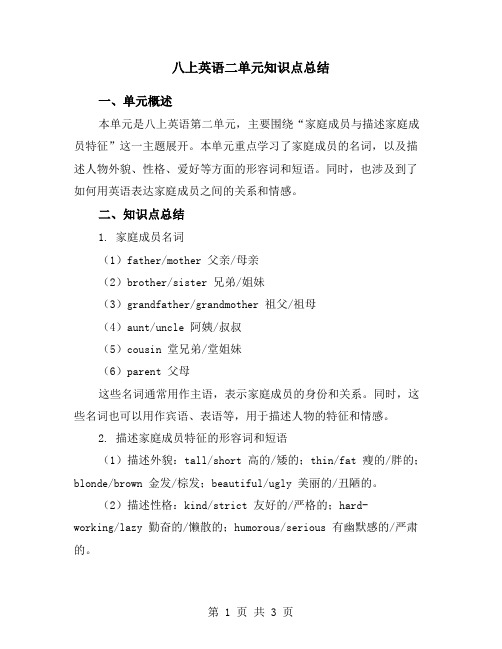
八上英语二单元知识点总结一、单元概述本单元是八上英语第二单元,主要围绕“家庭成员与描述家庭成员特征”这一主题展开。
本单元重点学习了家庭成员的名词,以及描述人物外貌、性格、爱好等方面的形容词和短语。
同时,也涉及到了如何用英语表达家庭成员之间的关系和情感。
二、知识点总结1. 家庭成员名词(1)father/mother 父亲/母亲(2)brother/sister 兄弟/姐妹(3)grandfather/grandmother 祖父/祖母(4)aunt/uncle 阿姨/叔叔(5)cousin 堂兄弟/堂姐妹(6)parent 父母这些名词通常用作主语,表示家庭成员的身份和关系。
同时,这些名词也可以用作宾语、表语等,用于描述人物的特征和情感。
2. 描述家庭成员特征的形容词和短语(1)描述外貌:tall/short 高的/矮的;thin/fat 瘦的/胖的;blonde/brown 金发/棕发;beautiful/ugly 美丽的/丑陋的。
(2)描述性格:kind/strict 友好的/严格的;hard-working/lazy 勤奋的/懒散的;humorous/serious 有幽默感的/严肃的。
(3)描述爱好:sports fan 运动迷;music lover 音乐爱好者;movie buff 电影迷;reading enthusiast 读书爱好者。
这些形容词和短语可以用来修饰家庭成员,表达他们的个性特点和兴趣爱好。
同时,也可以用来描述人物的整体形象和特点。
3. 表达家庭成员之间的关系和情感(1)family members love each other 家庭成员之间互相关爱。
(2)father and mother are my best friends 父亲和母亲是我最好的朋友。
(3)I miss my grandparents very much 我非常想念我的祖父母。
(4)I am proud of my family 我为我的家庭感到自豪。
八年级上册英语第二单元知识点
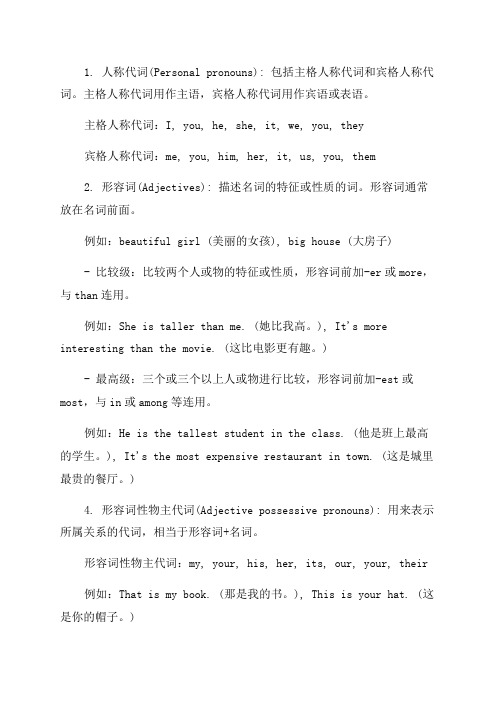
1. 人称代词(Personal pronouns): 包括主格人称代词和宾格人称代词。
主格人称代词用作主语,宾格人称代词用作宾语或表语。
主格人称代词:I, you, he, she, it, we, you, they宾格人称代词:me, you, him, her, it, us, you, them2. 形容词(Adjectives): 描述名词的特征或性质的词。
形容词通常放在名词前面。
例如:beautiful girl (美丽的女孩), big house (大房子)- 比较级:比较两个人或物的特征或性质,形容词前加-er或more,与than连用。
例如:She is taller than me. (她比我高。
), It's more interesting than the movie. (这比电影更有趣。
)- 最高级:三个或三个以上人或物进行比较,形容词前加-est或most,与in或among等连用。
例如:He is the tallest student in the class. (他是班上最高的学生。
), It's the most expensive restaurant in town. (这是城里最贵的餐厅。
)4. 形容词性物主代词(Adjective possessive pronouns): 用来表示所属关系的代词,相当于形容词+名词。
形容词性物主代词:my, your, his, her, its, our, your, their 例如:That is my book. (那是我的书。
), This is your hat. (这是你的帽子。
)5. 名词性物主代词(Noun possessive pronouns): 用来表示所属关系的代词,相当于名词,不需要后面加名词。
名词性物主代词:mine, yours, his, hers, its, ours, yours, theirs例如:Is this pen yours? (这支钢笔是你的吗?), The book on the table is mine. (桌子上的那本书是我的。
八年级上册英语第2单元知识点

八年级上册英语第2单元知识点一、重点单词。
1. housework.- 名词,意为“家务劳动;家务事”。
例如:I often help my mother do housework on weekends.(我经常在周末帮助我妈妈做家务。
)2. hardly.- 副词,意为“几乎不;几乎没有”,本身含有否定意义。
例如:He can hardly speak English.(他几乎不会说英语。
)3. ever.- 副词,意为“在任何时候;从来;曾经”。
常用于现在完成时的一般疑问句和否定句中。
例如:Have you ever been to Beijing?(你曾经去过北京吗?)4. once.- 副词,意为“一次;曾经”。
例如:I go to the movies once a month.(我一个月去看一次电影。
)也可作名词,意为“一次”。
5. twice.- 副词,意为“两次;两倍”。
例如:I have been to Shanghai twice.(我去过上海两次。
)6. Internet.- 名词,意为“(国际)互联网;因特网”。
例如:We can get a lot of information on the Internet.(我们能在互联网上得到很多信息。
)7. program.8. full.- 形容词,意为“忙的;满的;充满的”。
be full of = be filled with,意为“充满……”。
例如:The glass is full of water.(杯子里装满了水。
)9. maybe.- 副词,意为“大概;或许;可能”,一般用于句首。
例如:Maybe he is at home.(也许他在家。
)注意与may be(可能是,作谓语)的区别,如:He may be at home.(他可能在家。
)10. least.- 形容词或副词(little的最高级),意为“最小;最少;最轻微”。
八年级英语上unit2 知识点

八年级英语上unit2 知识点八年级英语上Unit 2知识点Unit 2的主要内容是关于家庭和亲戚的话题。
在这个单元,我们将学习如何询问关于家庭和亲戚的问题,并用正确的时态和语法来回答这些问题。
下面是本单元中需要掌握的关键知识点。
1. 家庭与亲戚的词汇在学习关于家庭和亲戚的话题时,我们需要先掌握一些基本的词汇。
(1) 家庭成员:father(父亲)、 mother(母亲)、 parents(父母)、 brother(兄弟)、 sister(姐妹)、 son(儿子)、daughter(女儿)、 grandparents(祖父母)、 grandchildren(孙子孙女)等。
(2) 亲戚关系:uncle(叔叔)、 aunt(阿姨)、 cousin(堂兄弟/姐妹)、 nephew(侄子)、 niece(侄女)、 brother-in-law (姐夫/妹夫)、 sister-in-law(嫂子/弟妹)等。
2. 询问关于家庭和亲戚的问题在英语中询问关于家庭和亲戚的问题有几种方式。
(1) Who is your father? (你的父亲是谁?)(2) Do you have any brothers or sisters? (你有兄弟姐妹吗?)(3) How many people are there in your family? (你家有几口人?)(4) What do your parents do? (你父母是做什么工作的?)(5) Do you get along well with your siblings? (你和你的兄弟姐妹相处得好吗?)3. 时态与语法在回答关于家庭和亲戚的问题时,我们需要注意使用正确的时态和语法。
(1) 现在时态:使用现在时态来描述目前的家庭和亲戚状况。
例如:- My father is a doctor.(我父亲是一名医生。
)- I have one brother and two sisters.(我有一个兄弟和两个姐妹。
(完整版)八年级上册英语第二单元知识点梳理
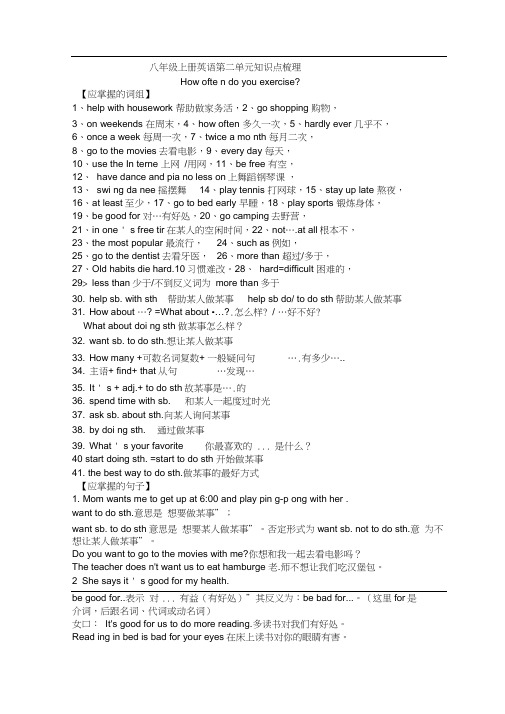
八年级上册英语第二单元知识点梳理How ofte n do you exercise?【应掌握的词组】1、help with housework 帮助做家务活,2、go shopping 购物,3、on weekends 在周末,4、how often 多久一次,5、hardly ever 几乎不,6、once a week 每周一次,7、twice a mo nth 每月二次,8、go to the movies去看电影,9、every day 每天,10、use the In terne 上网/用网,11、be free 有空,12、have dance and pia no less on上舞蹈钢琴课,13、swi ng da nee 摇摆舞14、play tennis 打网球,15、stay up late 熬夜,16、at least至少,17、go to bed early 早睡,18、play sports 锻炼身体,19、be good for 对…有好处,20、go camping去野营,21、in one ' s free tir在某人的空闲时间,22、not….at all根本不,23、the most popular 最流行,24、such as例如,25、go to the dentist去看牙医,26、more than 超过/多于,27、Old habits die hard.10习惯难改。
28、hard=difficult 困难的,29> less than少于/不到反义词为more than多于30. help sb. with sth 帮助某人做某事help sb do/ to do sth帮助某人做某事31. How about …? =What about •…?.怎么样? / …好不好?What about doi ng sth做某事怎么样?32. want sb. to do sth.想让某人做某事33. How many +可数名词复数+ 一般疑问句….有多少…..34. 主语+ find+ that从句…发现…35. It ' s + adj.+ to do sth故某事是….的36. spend time with sb. 和某人一起度过时光37. ask sb. about sth.向某人询问某事38. by doi ng sth. 通过做某事39. What ' s your favorite 你最喜欢的 ... 是什么?40 start doing sth. =start to do sth 开始做某事41. the best way to do sth.做某事的最好方式【应掌握的句子】1. Mom wants me to get up at 6:00 and play pin g-p ong with her .want to do sth.意思是想要做某事”;want sb. to do sth意思是想要某人做某事”。
八年级上册英语二单元知识点
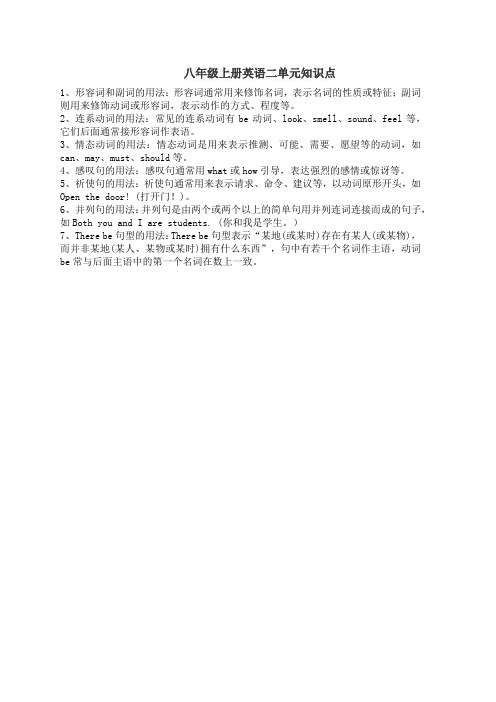
八年级上册英语二单元知识点
1、形容词和副词的用法:形容词通常用来修饰名词,表示名词的性质或特征;副词则用来修饰动词或形容词,表示动作的方式、程度等。
2、连系动词的用法:常见的连系动词有be动词、look、smell、sound、feel等,它们后面通常接形容词作表语。
3、情态动词的用法:情态动词是用来表示推测、可能、需要、愿望等的动词,如can、may、must、should等。
4、感叹句的用法:感叹句通常用what或how引导,表达强烈的感情或惊讶等。
5、祈使句的用法:祈使句通常用来表示请求、命令、建议等,以动词原形开头,如Open the door! (打开门!)。
6、并列句的用法:并列句是由两个或两个以上的简单句用并列连词连接而成的句子,如Both you and I are students. (你和我是学生。
)
7、There be句型的用法:There be句型表示“某地(或某时)存在有某人(或某物),而并非某地(某人、某物或某时)拥有什么东西”,句中有若干个名词作主语,动词be常与后面主语中的第一个名词在数上一致。
八年级上册英语unit2知识点归纳
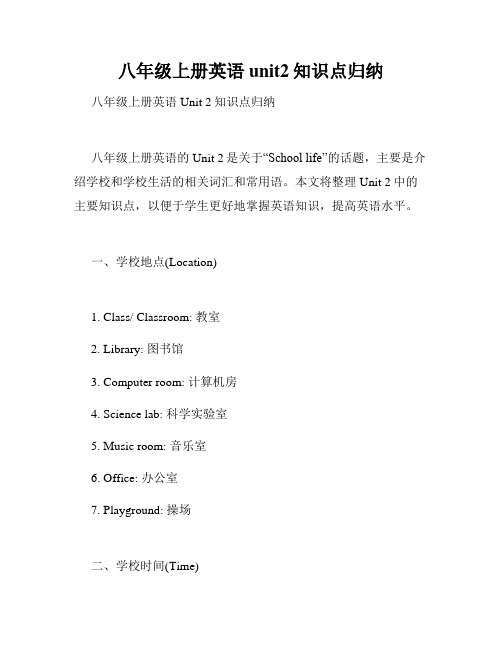
八年级上册英语unit2知识点归纳八年级上册英语Unit 2知识点归纳八年级上册英语的Unit 2是关于“School life”的话题,主要是介绍学校和学校生活的相关词汇和常用语。
本文将整理Unit 2中的主要知识点,以便于学生更好地掌握英语知识,提高英语水平。
一、学校地点(Location)1. Class/ Classroom: 教室2. Library: 图书馆3. Computer room: 计算机房4. Science lab: 科学实验室5. Music room: 音乐室6. Office: 办公室7. Playground: 操场二、学校时间(Time)1. Class time: 上课时间2. Break time: 休息时间3. Lunch time: 午饭时间4. After-school program: 放学后活动三、学校相关人员(People)1. Teacher: 教师2. Student: 学生3. Principal: 校长4. Office staff: 办公人员5. Janitor: 门卫四、学校课程(Curriculum)1. Subject: 科目2. Math: 数学3. Science: 科学4. Social studies: 社会科学5. English: 英语6. Art: 艺术7. Music: 音乐8. PE(Physical education): 体育五、学校生活(School life)1. Attend school/ Go to school: 上学2. Take a bus/ Walk to school: 坐校车/ 步行3. Eat lunch/ Buy lunch: 吃午饭/ 买午饭4. Study for an exam: 为考试学习5. Join a club/ Sports team: 参加俱乐部/ 运动队6. Do homework/ Studying: 做作业/ 学习7. Use a computer: 使用电脑六、常用口语(Common expressions)1. What time is it? : 现在几点了?2. Good morning/ afternoon/ evening: 早上/ 下午/ 晚上好3. How are you? : 你好吗?4. What class do you have now? : 你现在有什么课?5. I’m sorry/ Excuse me: 对不起/ 打扰一下6. Can you help me please? : 你能帮我一下吗?7. Thank you: 谢谢8. Goodbye: 再见总结:本文所归纳的知识点为八年级上册英语Unit 2的内容,主要是围绕“School life”话题展开的。
人教版八年级上册第二单元知识点归纳
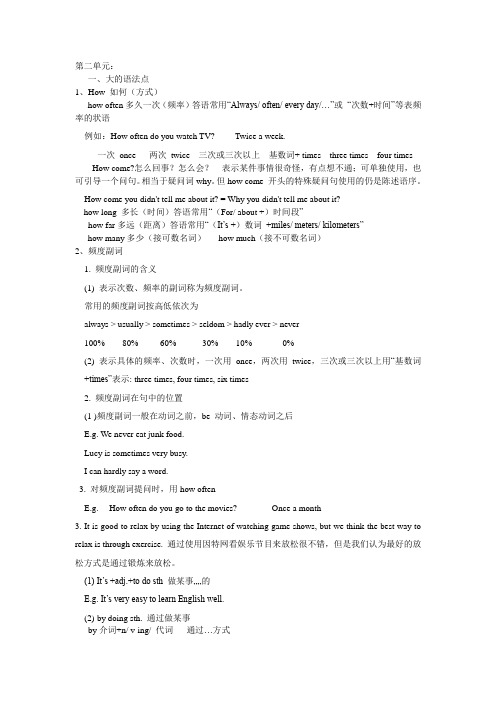
第二单元:一、大的语法点1、How 如何(方式)how often多久一次(频率)答语常用“Always/ often/ every day/…”或“次数+时间”等表频率的状语例如:How often do you watch TV? ----Twice a week.一次once 两次twice 三次或三次以上基数词+ times three times four times How come?怎么回事?怎么会?表示某件事情很奇怪,有点想不通;可单独使用,也可引导一个问句。
相当于疑问词why。
但how come 开头的特殊疑问句使用的仍是陈述语序。
How come you didn't tell me about it? = Why you didn't tell me about it?how long 多长(时间)答语常用“(For/ about +)时间段”how far多远(距离)答语常用“(It’s +)数词+miles/ meters/ kilometers”how many多少(接可数名词)how much(接不可数名词)2、频度副词1. 频度副词的含义(1) 表示次数、频率的副词称为频度副词。
常用的频度副词按高低依次为always > usually > sometimes > seldom > hadly ever > never100% 80% 60% 30% 10% 0%(2) 表示具体的频率、次数时,一次用once,两次用twice,三次或三次以上用“基数词+times”表示: three times, four times, six times2. 频度副词在句中的位置(1 )频度副词一般在动词之前,be 动词、情态动词之后E.g. We never eat junk food.Lucy is sometimes very busy.I can hardly say a word.3. 对频度副词提问时,用how oftenE.g. ---How often do you go to the movies? ---Once a month3. It is good to relax by using the Internet of watching game shows, but we think the best way torelax is through exercise. 通过使用因特网看娱乐节目来放松很不错,但是我们认为最好的放松方式是通过锻炼来放松。
(重要)新目标八年级上册英语第二单元
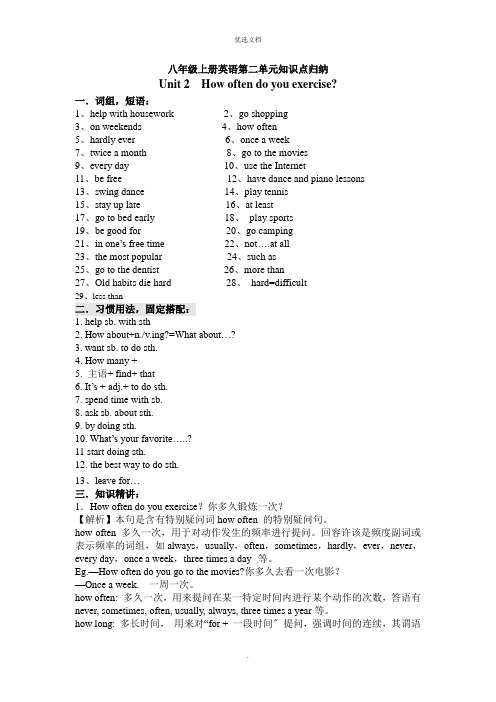
八年级上册英语第二单元知识点归纳Unit 2 How often do you exercise?一.词组,短语:1、help with housework2、go shopping3、on weekends4、how often5、hardly ever6、once a week7、twice a month 8、go to the movies9、every day 10、use the Internet11、be free 12、have dance and piano lessons13、swing dance 14、play tennis15、stay up late 16、at least17、go to bed early 18、play sports19、be good for 20、go camping21、in one’s free time 22、not….at all23、the most popular 24、such as25、go to the dentist 26、more than27、Old habits die hard 28、hard=difficult29、less than二.习惯用法,固定搭配:1. help sb. with sth2. How about+n./v.ing?=What about…?3. want sb. to do sth.4. How many +5. 主语+ find+ that6. It’s + adj.+ to do sth.7. spend time with sb.8. ask sb. about sth.9. by doing sth.10. What’s your favorite…..?11 start doing sth.12. the best way to do sth.13、leave for…三.知识精讲:1.How often do you exercise?你多久锻炼一次?【解析】本句是含有特别疑问词how often 的特别疑问句。
八年级上册英语unit2知识点归纳人教版
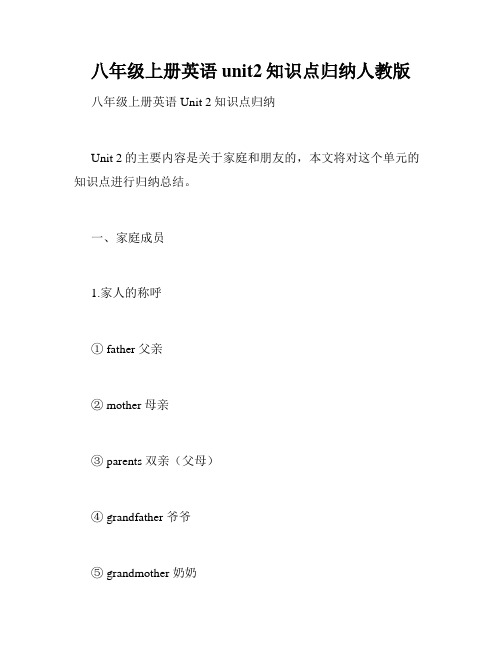
八年级上册英语unit2知识点归纳人教版八年级上册英语Unit 2知识点归纳Unit 2的主要内容是关于家庭和朋友的,本文将对这个单元的知识点进行归纳总结。
一、家庭成员1.家人的称呼① father 父亲② mother 母亲③ parents 双亲(父母)④ grandfather 爷爷⑤ grandmother 奶奶⑥ grandparents 祖父母(外公外婆或者爷爷奶奶)⑦ son 儿子⑧ daughter 女儿⑨ children 孩子⑩ elder brother 哥哥⑪ younger brother 弟弟⑫ elder sister 姐姐⑬ younger sister 妹妹2.家庭成员的职业father:teacher, doctor, businessman, worker…mother:nurse, musician, artist, housewife…grandfather / grandmother:retired, farmer, scientist, writer…brother / sister:student, athlete, musician, artist, …二、家务1.厨房用具① microwave 微波炉② refrigerator 冰箱③ stove 火炉④ oven 烤箱⑤ blender 搅拌器⑥ toaster 烤面包机⑦ kettle 水壶2.家务动词① cook 做饭② wash the dishes 洗碗③ sweep 扫地④ mop 拖地⑤ clean the bathroom 打扫浴室⑥ make the bed 整理床铺⑦ do the laundry 洗衣服三、朋友1.朋友类型① best friend 最好的朋友② close friend 亲密的朋友③ new friend 新朋友④ childhood friend 童年时的朋友⑤ schoolmate 同学2.谈论朋友的习惯和特点① He / She is always there for me. 他 / 她总是在我身边。
八年级上册英语第二单元短语
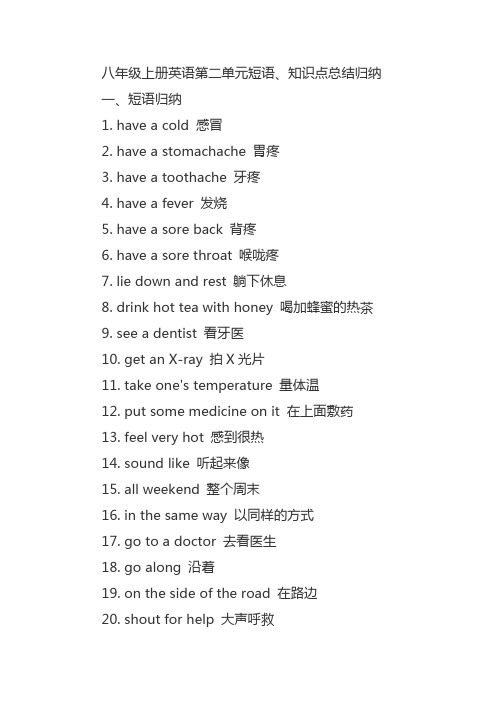
八年级上册英语第二单元短语、知识点总结归纳一、短语归纳1. have a cold 感冒2. have a stomachache 胃疼3. have a toothache 牙疼4. have a fever 发烧5. have a sore back 背疼6. have a sore throat 喉咙疼7. lie down and rest 躺下休息8. drink hot tea with honey 喝加蜂蜜的热茶9. see a dentist 看牙医10. get an X-ray 拍X光片11. take one's temperature 量体温12. put some medicine on it 在上面敷药13. feel very hot 感到很热14. sound like 听起来像15. all weekend 整个周末16. in the same way 以同样的方式17. go to a doctor 去看医生18. go along 沿着19. on the side of the road 在路边20. shout for help 大声呼救21. without thinking twice 没有多想22. get off 下车23. have a heart problem 有心脏病24. to one's surprise 使某人惊讶的是25. thanks to 多亏了;由于26. in time 及时27. save a life 挽救生命28. make a decision 做出决定29. get into trouble 遇到麻烦二、重点句型1. What's the matter? (= What's the trouble? / What's wrong? / What's the problem? ) 怎么了?I have a headache. 我头疼。
8年级英语上册第二单元知识点

第一节:词汇部分1. Unit 2第二单元2. Vocabulary 词汇3. Learn 单词4. Target 目标5. Improve 内容6. Complete 完整第二节:阅读理解1. Comprehension 理解2. Passage 历程3. Understanding 理解4. Answer 回答5. Question 问题6. M本人n idea 主要观点第三节:语法部分1. Grammar 语法2. Present tense 现在时3. Past tense 过去时4. Future tense 将来时5. Simple present 现在一般时6. Simple past 过去一般时第四节:听力部分1. Listening 听力2. Conversation 对话3. Dialogue 对话4. Question 问题5. Answer 回答6. Understanding 理解第五节:口语部分1. Speaking 口语2. Dialog 对话3. Practice 练习4. Fluency 流利度5. Accuracy 准确性6. Pronunciation 发音第六节:写作部分1. Writing 写作2. Composition 作文3. Structure 结构4. Content 内容5. Organization 组织6. Conventions 约定第七节:生词1. New words 生词2. Vocabulary 词汇3. English 英语4. Chinese 汉语5. Translation 翻译6. Meaning 意思第八节:课后练习1. Homework 作业2. Practise 练习3. Review 复习4. Consolidate 巩固5. Understand 理解6. Improve 改进第九节:备考建议1. Tips 提示2. Strategies 策略3. Practice 练习4. Time management 时间管理5. Confidence 自信心6. Relax 放松第十节:学习资源1. Resources 资源2. Textbook 教科书3. Workbook 练习册4. Audio CD 录音光盘5. Online resources 上线资源6. Library 图书馆第十一节:学习习惯1. Habits 习惯2. Regularity 规律性3. Consistency 一致性4. Discipline 自律5. Focus 专注6. Persistence 持续性第十二节:关于英语学习的误区1. Misconceptions 误解2. Fluent 流利3. Memorization 记忆4. Grammar 语法5. Perfect 完美6. Native speaker 母语者第十三节:教师建议1. Advice 建议2. Encouragement 鼓励3. Feedback 反馈4. Support 支持5. Guidance 指导6. Motivation 动力第十四节:学生问题解答1. Questions 问题2. Answers 答案3. Help 帮助4. Advice 建议5. Confusion 困惑6. Misunderstanding 误解第十五节:学科整合1. Integration 整合2. Science 科学3. Mathematics 数学4. History 历史5. Geography 地理6. Art 艺术经过以上对8年级英语上册第二单元知识点的详细介绍,相信您对这一单元的知识点有了更全面的了解。
新版八年级英语上册第二单元知识点归纳
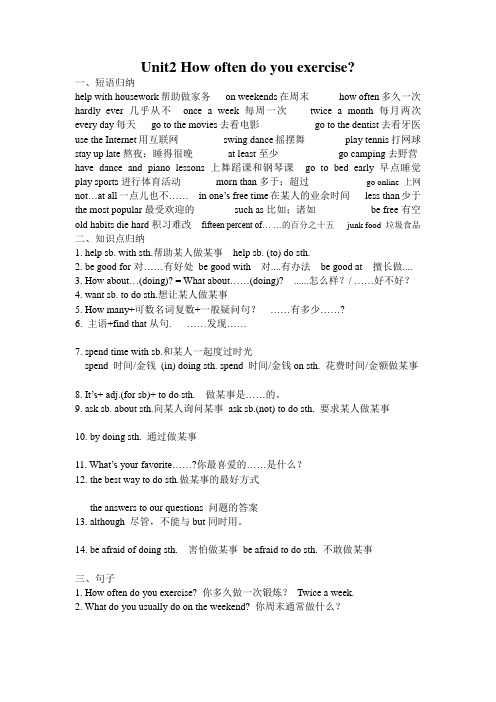
Unit2 How often do you exercise?一、短语归纳help with housework帮助做家务on weekends在周末how often多久一次hardly ever几乎从不once a week每周一次twice a month每月两次every day每天go to the movies去看电影go to the dentist去看牙医use the Internet用互联网swing dance摇摆舞play tennis打网球stay up late熬夜;睡得很晚at least至少go camping去野营have dance and piano lessons上舞蹈课和钢琴课go to bed early早点睡觉play sports进行体育活动morn than多于;超过go online 上网not…at all一点儿也不…… in one’s fre e time在某人的业余时间less than少于the most popular最受欢迎的such as比如;诸如be free有空old habits die hard积习难改fifteen percent of……的百分之十五junk food 垃圾食品二、知识点归纳1. help sb. with sth.帮助某人做某事help sb. (to) do sth.2. be good for对……有好处be good with 对....有办法be good at 擅长做....3. How about…(doing)? = What about……(doing)? ......怎么样?/ ……好不好?4. want sb. to do sth.想让某人做某事5. How many+可数名词复数+一般疑问句?……有多少……?6. 主语+find that从句. ……发现……7. spend time with sb.和某人一起度过时光spend 时间/金钱(in) doing sth. spend 时间/金钱on sth. 花费时间/金额做某事8. It’s+ adj.(for sb)+ to do sth. 做某事是……的。
八年级上册英语第二单元知识点
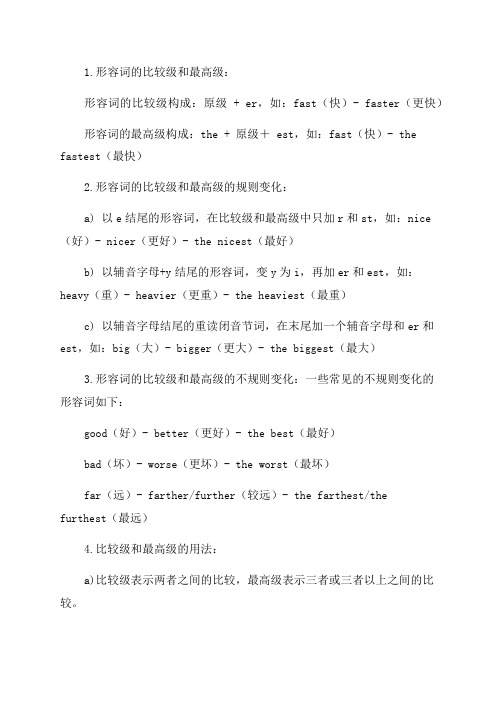
1.形容词的比较级和最高级:形容词的比较级构成:原级 + er,如:fast(快)- faster(更快)形容词的最高级构成:the + 原级+ est,如:fast(快)- the fastest(最快)2.形容词的比较级和最高级的规则变化:a) 以e结尾的形容词,在比较级和最高级中只加r和st,如:nice (好)- nicer(更好)- the nicest(最好)b) 以辅音字母+y结尾的形容词,变y为i,再加er和est,如:heavy(重)- heavier(更重)- the heaviest(最重)c) 以辅音字母结尾的重读闭音节词,在末尾加一个辅音字母和er和est,如:big(大)- bigger(更大)- the biggest(最大)3.形容词的比较级和最高级的不规则变化:一些常见的不规则变化的形容词如下:good(好)- better(更好)- the best(最好)bad(坏)- worse(更坏)- the worst(最坏)far(远)- farther/further(较远)- the farthest/thefurthest(最远)4.比较级和最高级的用法:a)比较级表示两者之间的比较,最高级表示三者或三者以上之间的比较。
b) 形容词的比较级前可以用much, a little, a bit等词修饰,最高级前可以用the修饰,表示最。
c)两个人或物进行比较时,用比较级,三个人或物进行比较时,用最高级。
5.表示原因的连词:a) because表示因果关系,连接原因和结果。
b) so表示因果关系,连接结果和原因。
c) because和so可以分别带上述连接词来连接复合句的句子。
d) though虽然,意为“尽管”,引导让步状语从句。
6.定义关系的连词:a) that引导定语从句,修饰先行词并起定义作用。
b) who/whom引导定语从句,修饰先行词表示人。
c) which引导定语从句,修饰先行词表示物。
八年级上册英语第二单元的知识点

八年级上册英语第二单元的知识点摘要:一、单元概述1.单元主题:家庭与人物介绍2.单元目标:学习家庭成员的英文表达,掌握一般现在时态的疑问句和否定句二、知识点详解1.家庭关系词汇- 家庭成员:父母、兄弟姐妹、祖父母、孙子孙女- 亲戚:叔叔、姑姑、堂兄弟姐妹、表兄弟姐妹2.一般现在时态- 肯定句结构:主语+ 动词原形/三单形式+ 其它成分- 疑问句结构:Be 动词/助动词+ 主语+ 其它成分?- 否定句结构:主语+ be 动词/助动词+ not + 动词原形/三单形式+ 其它成分3.一般现在时态的疑问句和否定句- 疑问句:Be 动词/助动词+ 主语+ 其它成分?- 否定句:主语+ be 动词/助动词+ not + 动词原形/三单形式+ 其它成分正文:在八年级上册英语第二单元中,我们学习了与家庭和人物介绍相关的知识点。
本单元的主题是家庭,通过学习家庭成员的关系和英文表达,同学们可以更好地理解和描述自己的家庭。
首先,我们学习了家庭成员的英文词汇。
包括父母(mom, dad)、兄弟姐妹(brother, sister)、祖父母(grandparent)、孙子孙女(grandson, granddaughter)等。
此外,还学习了亲戚的英文表达,如叔叔(uncle)、姑姑(aunt)、堂兄弟姐妹(cousin)和表兄弟姐妹(second cousin)等。
掌握这些词汇有助于同学们在描述家庭成员时更加准确和全面。
其次,本单元重点讲解了一般现在时态。
一般现在时态表示经常发生或习惯性的动作,例如:I get up at 7:00 in the morning.(我早上七点起床。
)在一般现在时态中,动词通常使用原形或第三人称单数形式。
此外,我们还学习了如何用一般现在时态提问和否定。
在疑问句中,我们使用Be 动词或助动词(如is, are, do, does)来构成疑问句,如:Do you have breakfast at 7:00?(你早上七点吃早餐吗?)在否定句中,我们在主语后加上Be 动词或助动词以及not,如:I don"t watch TV after dinner.(我晚餐后不看电视。
英语八年级上二单元知识点
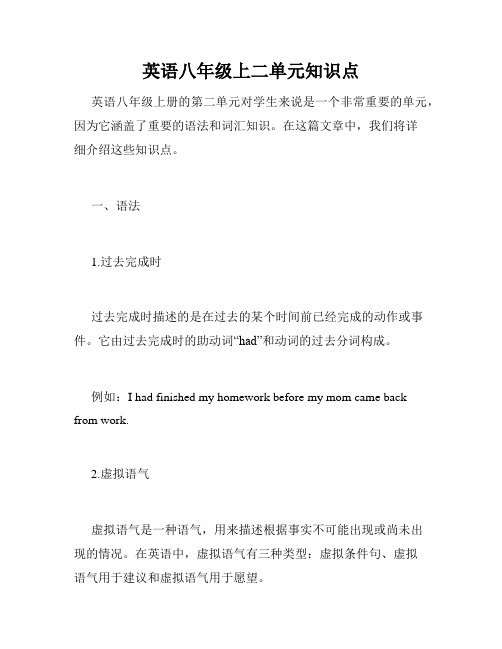
英语八年级上二单元知识点英语八年级上册的第二单元对学生来说是一个非常重要的单元,因为它涵盖了重要的语法和词汇知识。
在这篇文章中,我们将详细介绍这些知识点。
一、语法1.过去完成时过去完成时描述的是在过去的某个时间前已经完成的动作或事件。
它由过去完成时的助动词“had”和动词的过去分词构成。
例如:I had finished my homework before my mom came back from work.2.虚拟语气虚拟语气是一种语气,用来描述根据事实不可能出现或尚未出现的情况。
在英语中,虚拟语气有三种类型:虚拟条件句、虚拟语气用于建议和虚拟语气用于愿望。
例如:If I were you, I would study harder. (虚拟条件句)3.被动语态被动语态由“be”动词和动词的过去分词构成,用于强调动作的承受者而不是动作的执行者。
在被动语态中,动作的执行者通常被省略。
例如:The book was written by Jane.二、词汇1.常见的形容词和副词形容词:good, bad, happy, sad, smart, lazy, beautiful, ugly, interesting, boring副词:well, badly, happily, sadly, smartly, lazily, beautifully, uglily, interestingly, boringly2.常见的动词短语动词短语:look after, take care of, be interested in, be good at, be proud of, be afraid of, be angry with, be tired of, be worried about, be amazed at3.常见的名词名词:friend, family, school, teacher, student, parent, book, movie, music, game总之,英语八年级上册第二单元的语法和词汇知识点是学生必须掌握的重要部分。
最全面人教版八年级上册英语第二单元知识点归纳总结
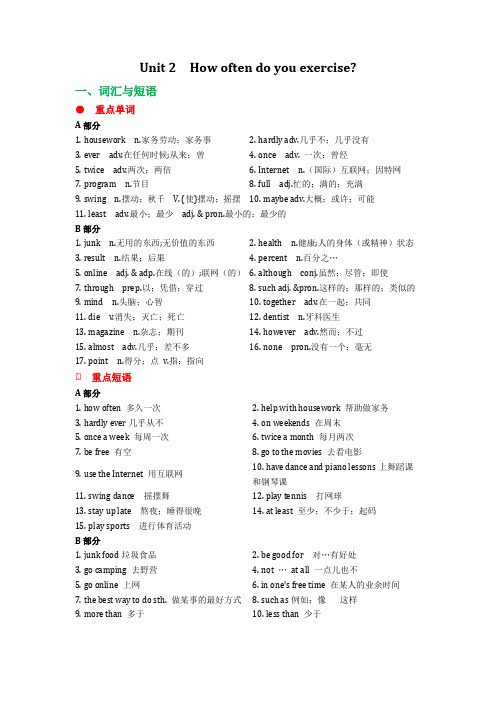
Unit 2 How often do you exercise?一、词汇与短语●重点单词A部分1.housework n.家务劳动;家务事2.hardly adv.几乎不;几乎没有3.ever adv.在任何时候;从来;曾4.once adv. 一次;曾经5.twice adv.两次;两倍6.Internet n.(国际)互联网;因特网7.program n.节目8.full adj.忙的;满的;充满9.swing n.摆动;秋千V. (使)摆动;摇摆10.maybe adv.大概;或许;可能11.least adv.最小;最少adj. & pron.最小的;最少的B部分1.junk n.无用的东西;无价值的东西2.health n.健康;人的身体(或精神)状态3.result n.结果;后果4.percent n.百分之…5.online adj. & adp.在线(的);联网(的)6.although conj.虽然;尽管;即使7.through prep.以;凭借;穿过8.such adj. &pron.这样的;那样的;类似的9.mind n.头脑;心智10.together adv.在一起;共同11.die v.消失;灭亡;死亡12.dentist n.牙科医生13.magazine n.杂志;期刊14.however adv.然而;不过15.almost adv.几乎;差不多16.none pron.没有一个;毫无17.point n.得分;点v.指;指向● 重点短语A部分1.how often 多久一次2.help with housework 帮助做家务3.hardly ever几乎从不4.on weekends 在周末5.once a week 每周一次6.twice a month 每月两次7.be free 有空8.go to the movies 去看电影e the Internet 用互联网10.have dance and piano lessons上舞蹈课和钢琴课11.swing dance 摇摆舞12.play tennis 打网球13.stay up late 熬夜;睡得很晚14.at least 至少;不少于;起码15.play sports 进行体育活动B部分1.junk food垃圾食品2.be good for 对…有好处3.go camping 去野营4.not …at all 一点儿也不5.go online 上网6.in one's free time 在某人的业余时间7.the best way to do sth. 做某事的最好方式8.such as例如;像这样9.more than 多于10.less than 少于● 重点句子A部分1.--What do you usually do on weekends? --I often go to the movies."在周末你通常做什么?”“我经常去看电影。
最全面人教版八年级上册英语第二单元知识点归纳总结

Unit 2 How often do you exercise?一、词汇与短语●重点单词A部分1.housework n.家务劳动;家务事2.hardly adv.几乎不;几乎没有3.ever adv.在任何时候;从来;曾4.once adv. 一次;曾经5.twice adv.两次;两倍6.Internet n.(国际)互联网;因特网7.program n.节目8.full adj.忙的;满的;充满9.swing n.摆动;秋千V. (使)摆动;摇摆10.maybe adv.大概;或许;可能11.least adv.最小;最少adj. & pron.最小的;最少的B部分1.junk n.无用的东西;无价值的东西2.health n.健康;人的身体(或精神)状态3.result n.结果;后果4.percent n.百分之…5.online adj. & adp.在线(的);联网(的)6.although conj.虽然;尽管;即使7.through prep.以;凭借;穿过8.such adj. &pron.这样的;那样的;类似的9.mind n.头脑;心智10.together adv.在一起;共同11.die v.消失;灭亡;死亡12.dentist n.牙科医生13.magazine n.杂志;期刊14.however adv.然而;不过15.almost adv.几乎;差不多16.none pron.没有一个;毫无17.point n.得分;点v.指;指向● 重点短语A部分1.how often 多久一次2.help with housework 帮助做家务3.hardly ever几乎从不4.on weekends 在周末5.once a week 每周一次6.twice a month 每月两次7.be free 有空8.go to the movies 去看电影e the Internet 用互联网10.have dance and piano lessons上舞蹈课和钢琴课11.swing dance 摇摆舞12.play tennis 打网球13.stay up late 熬夜;睡得很晚14.at least 至少;不少于;起码15.play sports 进行体育活动B部分1.junk food垃圾食品2.be good for 对…有好处3.go camping 去野营4.not …at all 一点儿也不5.go online 上网6.in one's free time 在某人的业余时间7.the best way to do sth. 做某事的最好方式8.such as例如;像这样9.more than 多于10.less than 少于● 重点句子A部分1.--What do you usually do on weekends? --I often go to the movies."在周末你通常做什么?”“我经常去看电影。
- 1、下载文档前请自行甄别文档内容的完整性,平台不提供额外的编辑、内容补充、找答案等附加服务。
- 2、"仅部分预览"的文档,不可在线预览部分如存在完整性等问题,可反馈申请退款(可完整预览的文档不适用该条件!)。
- 3、如文档侵犯您的权益,请联系客服反馈,我们会尽快为您处理(人工客服工作时间:9:00-18:30)。
八年级上册英语第二单元知识点梳理How often do you exercise?【应掌握的词组】1、help with housework 帮助做家务活,2、go shopping 购物,3、on weekends 在周末,4、how often 多久一次,5、hardly ever几乎不,6、once a week 每周一次,7、twice a month每月二次,8、go to the movies去看电影,9、every day 每天,10、use the Internet上网/用网,11、be free有空,12、have dance and piano lessons 上舞蹈钢琴课,13、swing dance摇摆舞14、play tennis 打网球,15、stay up late熬夜,16、at least至少,17、go to bed early 早睡,18、play sports 锻炼身体,19、be good for 对…有好处,20、go camping去野营,21、in one’s free time 在某人的空闲时间,22、no t….at all 根本不,23、the most popular 最流行,24、such as例如,25、go to the dentist去看牙医,26、more than 超过/多于,27、Old habits die hard.旧习惯难改。
28、hard=difficult 困难的,29、less than 少于/不到反义词为more than多于30. help sb. with sth 帮助某人做某事help sb do/ to do sth 帮助某人做某事31. How about…? =What about…? ….怎么样?/ ….好不好?What about doing sth?做某事怎么样?32. want sb. to do sth. 想让某人做某事33. How many + 可数名词复数+ 一般疑问句….有多少…..34. 主语+ find+ that 从句…发现…35. It’s + adj.+ to do sth. 做某事是….的36. spend time with sb. 和某人一起度过时光37. ask sb. about sth. 向某人询问某事38. by doing sth. 通过做某事39. What’s your favorite…..? 你最喜欢的……是什么?40 start doing sth. =start to do sth 开始做某事41. the best way to do sth. 做某事的最好方式【应掌握的句子】1. Mom wants me to get up at 6:00 and play ping-pong with her .want to do sth. 意思是“想要做某事”;want sb. to do sth.意思是“想要某人做某事”。
否定形式为want sb. not to do sth. 意为“不想让某人做某事”。
Do you want to go to the movies with me?你想和我一起去看电影吗?The teacher doesn't want us to eat hamburgers.老师不想让我们吃汉堡包。
2 She says it’s good for my health.be good for...表示“对……有益(有好处)”;其反义为:be bad for...。
(这里for 是介词,后跟名词、代词或动名词)如:It's good for us to do more reading. 多读书对我们有好处。
Reading in bed is bad for your eyes.在床上读书对你的眼睛有害。
3 try to do sth.表示“尽力做某事”,而try doing sth.表示“(用某一办法)试着去做某事”。
如: You’d better try doing the experiment in another way.你最好试试用另一种方法做这个试验。
4、help sb.(to) do sth.帮助某人做某事5、That sounds interesting.这是“主语+系动词+表语”结构的简单句。
sound(听起来),look(看起来),smell (闻起来),taste(尝起来),feel(觉得),seem(好象),grow(变得),get(变得)等词在英语中可用作系动词,后跟形容词作表语。
如:It tastes good. 这味道好。
The music sounds very sweet. 这音乐听起来很入耳。
The smoke grew heavier and heavier. 烟雾变得越来越浓了。
6、help oneself (to sth) 随便吃某物,款待Help yourself to some fruit. 随便吃点水果。
Can′t help doing sth 情不自禁做某事She could’t help crying. 她忍不住哭了。
7、三个表示“也”的词:too用于句末;also用于句中;either用于否定句末尾。
8、be afraid to do sth.害怕做某事。
Be afraid of doing sth害怕做某事。
三、词语辨析1. help with housework 帮助做家务(1)help with sth. 意为“帮助做某事”拓展:help sb. with sth.= help sb. (to)do sth. 帮助某人做某事Eg: I often help him with his English.= I often help him (to) learn English. 我经常帮他学习英语。
(2)housework 意为“家务劳动”。
不可数名词。
1. They have much housework to do.2.辨析:sometimes ,some times ,sometime ,some timesometimes 有时候。
=at times也是“有时”的意思。
提问用how oftensome times 几次几倍。
time作可数名词时可作“次数”解;表示“时间”时是不可数名词。
How many timessometime 某个时候。
常指将来的某个时候。
提问用whensome time 一段时间。
常与for连用。
对它提问用how long 。
口诀记忆:分开“一段时间” ;相聚“某个时候”。
Eg:Sometimes I get up very late. 有时我起床很晚。
I will go to shanghai sometime next week. 下周某个时候我要去上海。
He reads the story some times. 他读这个故事几遍了。
I’ll stay here for some time. 我将会在这儿呆一段时间。
3. hardly ever 几乎不hardly ever相当于hardlyeg:There is hardly any food left. 几乎没有食物剩下。
辨析:hardly 与hardhardly 几乎不,一般位于动词之前。
hard 努力,位于动词之后。
eg:He hardly works. 他几乎不工作。
He works hard. 他工作努力。
4. use the Internet 用互联网(教材第10页)use sth. to do sth. 用某物做某事eg:I use a knife to cut bread. 我用刀切面包。
短语:on the Internet 在网上,surf the Internet 网上冲浪,上网5. What’s your favorite program?你最喜欢的节目是什么?句型:What’s your favorite...?=What... do you li ke best?你最喜欢的......是什么?1.What’s your favorite animal?你最喜欢的动物是什么?6. Are you free next week?你下周有空吗?free 意为“空闲的,有空的”,反义词busy。
be free 意为“闲着,有空”He is free now.他现在有空。
free还可译为“免费的”The tickets are free. 票是免费的。
7. ... next week is quite full for me... …下周对我来说相当忙…拓展:①full 还可译为“满的,充满的”。
I can’t eat any more,I am quite full. 我不能再吃了,我相当饱了。
8. How come? 怎么会?怎么回事?表示某件事情很奇怪,有点想不通;可单独使用,也可引导一个问句,相当于疑问句why, 但how come 开头的特殊疑问句使用的仍然是陈述语序。
How come Tom didn’t come to the party? = Why didn’t Tom come to the pa rty?9.How about...? (=What about...?) 意为“……怎么样?”,用来征求对方的意见。
How about this book? 这本书怎样?How / What about doing sth. ...? 做……怎么样?---What will we do on Sunday?星期天我们什么?---How about visiting the museum?去参观博物馆咋样?1011be good for 意为“对……有益”。
反义词为be bad for “对……有害”。
Vegetables are good for you. 蔬菜对你有好处。
拓展:be good at 擅长... be good at doing sth. 擅长做...12、ask sb. about sth. “询问某人关于某事”13、①. 百分数由percent来表示,构成:基数词+percent 。
Seventy percent of the boys 男生中70%②not... at all 意为“一点儿也不,根本不”。
I don’t know about it at all. 对那件事我一点也不知道。
拓展:not at all = you are welcome 意为“不用谢,不客气”。
